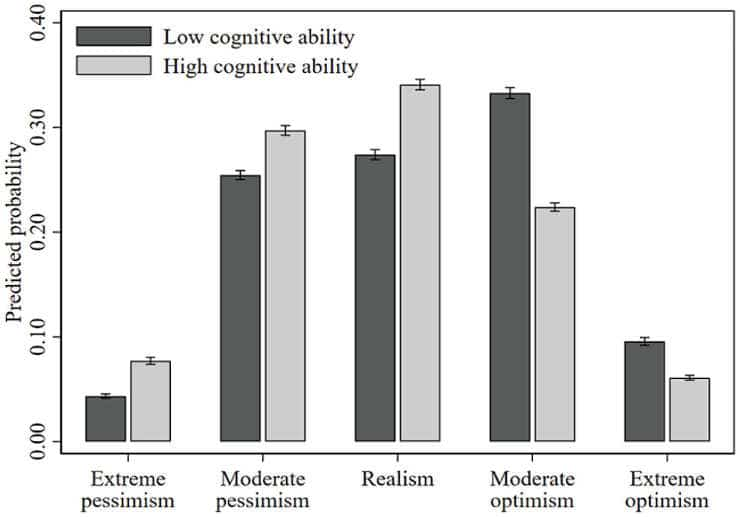Optimistic thinking has long been immortalized in self-help books as the key to happiness, good health and longevity, but it can also lead to poor decision-making, with particularly serious implications for people’s financial wellbeing.
According to research from the University of Bath, excessive optimism is connected with lower cognitive abilities such as verbal fluency, fluid reasoning, numerical reasoning, and memory. Those with high cognitive capacity, on the other hand, tend to be both more realistic and gloomy about the future.
“Forecasting the future with accuracy is difficult and for that reason we night expect those with low cognitive ability to make more errors in judgments, both pessimistic and optimistic. But the results are clear: low cognitive ability leads to more self-flattering biases – people essentially deluding themselves to a degree,”
said Dr Chris Dawson of the University’s School of Management.
Overriding Automatic Mode
While evolution has primed humans to expect the best, those with high cognitive ability are better able to override this automatic response when making critical decisions.
“Plans based on overly optimistic beliefs make for poor decisions and are bound to deliver worse outcomes than would realistic beliefs,”
Dr Dawson said.
Major financial decisions, such as employment, investments, or savings, as well as any choice involving risk and uncertainty, were particularly vulnerable to this effect, with serious consequences for individuals.
“Unrealistically optimistic financial expectations can lead to excessive levels of consumption and debt, as well as insufficient savings. It can also lead to excessive business entries and subsequent failures. The chances of starting a successful business are tiny, but optimists always think they have a shot and will start businesses destined to fail,”
Dr Dawson explained.
Realism vs Optimism

The study used data from a UK survey of over 36,000 homes to compare people’s expectations of their financial well-being to their actual financial outcomes. According to the findings, those with the highest cognitive capacity had a 22% increase in the probability of “realism” and a 35% decrease in the probability of “extreme optimism.”
“The problem with our being programmed to think positively is that it can adversely affect our quality of decision making, particularly when we have to make serious decisions. We need to be able to over-ride that and this research shows that people with high cognitive ability manage this better than those with low cognitive ability,”
said Dawson.
Unrealistic optimism is one of the most common human characteristics, and studies have shown that people continuously underestimate the negative and exaggerate the positive. The concept of ‘positive thinking’ is almost unquestionably ingrained in our culture – and it would be worthwhile to revisit that belief.
Abstract
It is a puzzle why humans tend toward unrealistic optimism, as it can lead to excessively risky behavior and a failure to take precautionary action. Using data from a large nationally representative U.K. sample our claim is that optimism bias is partly a consequence of low cognition—as measured by a broad range of cognitive skills, including memory, verbal fluency, fluid reasoning and numerical reasoning. We operationalize unrealistic optimism as the difference between a person’s financial expectation and the financial realization that follows, measured annually over a decade. All else being equal, those highest on cognitive ability experience a 22% (53.2%) increase in the probability of realism (pessimism) and a 34.8% reduction in optimism compared with those lowest on cognitive ability. This suggests that the negative consequences of an excessively optimistic mindset may, in part, be a side product of the true driver, low cognitive ability.
Reference:
- Dawson, C. (2023). Looking on the (B)right Side of Life: Cognitive Ability and Miscalibrated Financial Expectations. Personality and Social Psychology Bulletin, doi: 10.1177/01461672231209400
